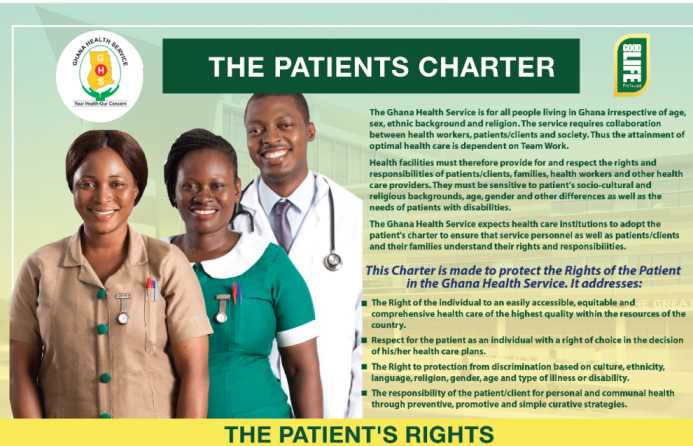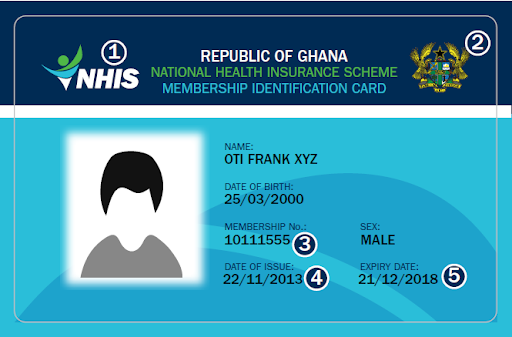Everyone needs access to healthcare in one way or the other. The term patient is broadly used to describe a sick person, one receiving medical treatment or who has registered to receive medical treatment.
Every patient has some fundamental rights that they must enjoy any time they visit any health facility in Ghana. Rights always go with responsibilities, and so patients are expected to take up some responsibilities while they are in any of such health facilities.
Everyone is liable to become a patient or the relative of a patient at any point in time. It is therefore expedient that we all become aware of the various rights and responsibilities of being a patient.
In Ghana, these rights and responsibilities of patients have been put together into a legal document called the Patient’s Charter. The patient’s charter has been documented as the sixth schedule in ACT 851 Public Health Act, 2012.
Why the Patient Charter?
The Patient’s Charter addresses the following topical areas:
- The rights of an individual to an easily accessible, equitable and comprehensive health care of the highest quality within the resources of the country.
- Respect for the patient as an individual with a right of choice in the decision of his/her health care plans.
- The rights of protection from discrimination based on culture, ethnicity, language, religion, gender, age and types of illness or disability.
- The responsibilities of the patient/client for personal and communal health through preventive, promotive and simple curative strategies.
It is expected of every healthcare provider to provide for and respect the rights and responsibilities of patients, clients, and families.
Health care providers are also expected to be sensitive to the patient’s socio-cultural and religious backgrounds, age, gender and any other differences and the needs of patients with disabilities.
What Are The Rights Of Patients In Ghana?
According to the Patient’s Charter, patients in Ghana are entitled to about 14 different rights. Everyone accessing healthcare is therefore eligible to enjoy all these rights irrespective of ethnic background, age, sex, or religion.
The rights include:
- The patient has the right to quality basic health care irrespective of his/her geographical location.
- The patient is entitled to full information on his/her condition and management and the possible risks involved except in emergency situations when the patient is unable to make a decision and the need for treatment is urgent.
- The patient is entitled to know of alternative treatment(s) and other health care providers within the service if these may contribute to improved outcomes.
- The patient has the right to know the identity of all his/her caregivers and other persons who may handle him/her including students, trainees and ancillary workers.
- The patient has the right to consent or decline to participate in a proposed research study involving him or her after a full explanation has been given. The patient may withdraw at any stage of the research project.
- A patient who declines to participate in or withdraws from a research project is entitled to the most effective care available.
- The patient has the right to privacy during consultation, examination and treatment. In cases where it is necessary to use the patient or his/her case notes for teaching and conferences, the consent of the patient must be sought.
- The patient is entitled to confidentiality of information obtained about him or her and such information shall not be disclosed to a third party without his/her consent or the person entitled to act on his/her behalf except where such information is required by law or is in the public interest.
- The patient is entitled to all relevant information regarding policies and regulation of the health facilities that he/she attends.
- Procedures for complaints, disputes and conflict resolution shall be explained to patients or their accredited representatives.
- Hospital charges, mode of payments and all forms of anticipated expenditure shall be explained to the patient prior to treatment.
- Exemption facilities, if any, shall be made known to the patient.
- The patient is entitled to personal safety and reasonable security of property within the confines of the Institution.
- The patient has the right to a second medical opinion if he/she so desires.
What Are The Responsibilities Of Patients?
As much as the patient is allowed to enjoy the above listed rights, it is also expected of every patient to take certain responsibilities. These responsibilities will be concerning the patient’s own health and also each patient will have to cooperate fully with the health care providers.
The following are the responsibilities of the patients as captured in the patient charter:
- Providing full and accurate medical history for his/her diagnosis, treatment, counseling and rehabilitation purposes.
- Requesting additional information and or clarification regarding his/her health or treatment, which may not have been well understood.
- Complying with prescribed treatment, reporting adverse effects and adhering, to follow up requests.
- Informing his/her healthcare providers of any anticipated problems in following prescribed treatment or advice.
- Obtaining all necessary information, which have a bearing on his/her management and treatment including all financial implications.
- Acquiring knowledge, on preventive, promotive and simple curative practices and where necessary as well as seeking early professional help.
- Maintaining a safe and hygienic environment in order to promote good health.
- Respecting the rights of other patients/clients and Health Service personnel
- Protecting the property of the Health facility.
For patients or clients who are considered minors or those who, for varying reasons, are unable to make informed decisions by themselves, these rights and responsibilities shall be exercised by accredited and recognized representatives.
It must be noted that the patient’s dignity and interest are always paramount in all healthcare activities.
Healthcare providers and professionals should therefore be aware of these rights and responsibilities explained in the Patient’s Charter in order not to infringe on any of them.
The attainment of the Health Service of Ghana is therefore through team work between health workers, patients, clients and the society at large.
Through teamwork among health workers, patients, clients, and the society at large, the health service in Ghana can successfully attain the specifications in the Patient’s Charter.







Leave a Comment